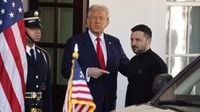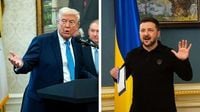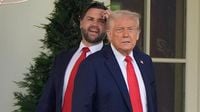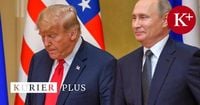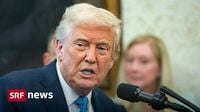In a significant and contentious development regarding the ongoing Ukraine conflict, U.S. President Donald Trump has presented a "final offer" aimed at ending the war, a move that has sparked intense debate and criticism from various quarters. The proposal, characterized as a one-page document, was reportedly shared with Ukrainian officials during a meeting in Paris last week and is now circulating in both Moscow and Kyiv.
According to sources familiar with the situation, the U.S. expects a response from Ukraine on Wednesday, April 23, 2025, to this peace framework. Central to the proposal is the recognition by the U.S. of Crimea as part of Russia, along with unofficial acknowledgment of Russian control over the territories occupied since the invasion in 2022. This aspect of the offer has drawn sharp criticism from Ukrainian President Volodymyr Zelensky, who has firmly stated that Ukraine will never recognize the Russian annexation of Crimea.
The document outlines substantial concessions to Russia, including the lifting of sanctions imposed since 2014, enhanced economic cooperation with the U.S. in energy and industrial sectors, and a promise that Ukraine will not pursue NATO membership. In return, the proposal offers Ukraine a "robust security guarantee" from a group of European nations, although details on the nature of this guarantee remain vague.
Critics within Ukraine view the proposal as heavily skewed in favor of Russia. A source close to the Ukrainian government described it as a "one-sided plan in favor of Russia," emphasizing that while the benefits for Russia are clearly delineated, the gains for Ukraine are vaguely articulated. The proposal promises the return of a small part of the Kharkiv region occupied by Russia, unimpeded navigation of the Dnieper River, and some form of compensation for rebuilding efforts, but lacks specificity on funding sources.
Adding to the complexity, Vice President J.D. Vance has intensified pressure on Ukraine to accept the deal, stating, "It's time for a yes - or the USA will withdraw from the negotiations." His comments reflect a broader sentiment within the U.S. administration that urgency is required to reach a resolution. However, this stance has not been well received in Kyiv, where officials express concerns about being pressured into unfavorable concessions.
In response to the proposal, Zelensky reiterated his position, declaring, "There is nothing to negotiate about. This violates our constitution. This is our territory, the territory of the Ukrainian people." His firm stance underscores the deep-seated issues surrounding territorial integrity and national sovereignty that are at the heart of the conflict.
As the U.S. pushes for a resolution, skepticism remains among European allies regarding the implications of recognizing Crimea as Russian territory. Several EU states have communicated to Washington that such recognition is non-negotiable, further complicating diplomatic efforts. The situation is further exacerbated by ongoing military actions, including reports of Russian attacks on civilian infrastructure, which continue to fuel tensions.
In light of these developments, the planned high-level talks in London on April 23 have been downgraded. Key figures, including U.S. Secretary of State Marco Rubio and Trump's special envoy Steve Witkoff, have canceled their participation, leading to a perception that the U.S. is stepping back from its leadership role in these negotiations.
Moreover, the ongoing violence has not ceased, with reports of Russian drone strikes on Ukrainian hospitals and civilian areas, prompting Zelensky to call for an immediate and unconditional ceasefire. He emphasized that Ukraine remains open to discussions for a ceasefire but insists on a clear framework that respects Ukraine's territorial integrity.
As the international community watches closely, the next steps in this diplomatic saga remain uncertain. Witkoff is expected to travel to Moscow for further discussions with Putin, but the outcome of these talks is shrouded in ambiguity. The Biden administration's approach to the conflict continues to evolve, with officials emphasizing the need for a pragmatic solution while balancing the expectations of both Ukraine and Russia.
With the stakes higher than ever, the situation in Ukraine remains fluid, and the implications of Trump's final offer could reshape the landscape of international relations in the region. As both sides weigh their options, the hope for a peaceful resolution hangs in the balance, with the specter of continued conflict looming large.
